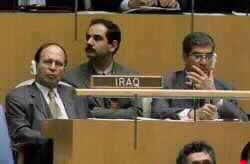Iraq open to new UN resolution as US lawmakers prepare to authorize attack
07/10/2002| IslamWeb
 Baghdad's UN ambassador said his country is open to a new UN Security Council resolution on arms inspections, as US lawmakers prepared to authorize President George W. Bush to attack Iraq. Iraqi ambassador Mohammed Aldouri said Baghdad would be willing to consider a new resolution as the world body prepared for a week of bargaining.
Baghdad's UN ambassador said his country is open to a new UN Security Council resolution on arms inspections, as US lawmakers prepared to authorize President George W. Bush to attack Iraq. Iraqi ambassador Mohammed Aldouri said Baghdad would be willing to consider a new resolution as the world body prepared for a week of bargaining.
"We are not rejecting any resolutions of the Security Council," he told the US television network ABC, although the Iraqi government has previously ruled out any new conditions before weapons inspectors return to Baghdad.
"We will see these resolutions. First of all to have this resolution in our hand, and after that we can conclude."
Meanwhile, key US lawmakers said a resolution authorizing Bush to disarm or oust Iraqi leader Saddam Hussein by force is likely to pass this week by wide margins, potentially strengthening the president's hand in negotiations with the United Nations.
Senate Majority Leader Tom Daschle, a key dissenter from a compromise draft accepted by most congressional leaders, told NBC television a 75-25 vote could be "in the range of what we could expect" in the Senate.
"This is the first pre-emptive, unilateral authorization of the use of force that we've ever passed, and so we want to be sure that we do it right," Daschle said.
"I think the biggest concern we have is just what the specific effort would be directed toward in terms of the -- of our purpose in using force itself. We want to tie it as directly as we can, really, to the question of weapons of mass destruction."
Bush cranked up the pressure in his weekly radio address Saturday, with a stark warning that war might be unavoidable.
"The danger to America from the Iraqi regime is grave and growing," Bush said, accusing Iraq of having defied the international community ever since the 1991 Gulf War over Kuwait.
Bush has warned the United Nations it risks becoming irrelevant if it fails to quickly back his plans, and his administration has said it has the right to act even without Security Council authorization.
While the five veto-wielding permanent members of the Security Council are unable to reach agreement over how to deal with Iraq, UN chief arms inspector Hans Blix has been forced to delay the return of disarmament inspectors.
Washington and London want to send Blix to Iraq, but only with a strong new mandate, backed by the threat of immediate military action if Iraq refuses to cooperate with his inspection teams.
France, however, is insisting on two resolutions, with only the second specifying the use of military force.
After a week of intense diplomacy, the United States and Britain still lack sufficient support to pass a single resolution and may be forced to agree to the French proposal, US and UN officials said.
Meanwhile, Baghdad continued to lobby for support among Arab neighbors which Washington may use as launchpads for any attack.
In the Gulf, Iraqi Foreign Minister Naji Sabri moved on to Oman after talks in Bahrain with King Hamad, who said he was satisfied Baghdad had agreed to the return of arms inspectors after a four-year break.
As part of a diplomatic offensive to persuade Arab neighbors to at least remain neutral if Washington attacks, Sabri is also due to visit Qatar and the United Arab Emirates.
Deputy Prime Minister Tareq Aziz goes Tuesday to Syria, then to Lebanon.
In London, British Foreign Secretary Jack Straw, set this week to sound out Iran, Jordan, Kuwait on the Iraq crisis, said all three states had cause to fear Baghdad.
"Each of these countries has reason to fear Saddam," Straw said on BBC Radio. "Jordan, Kuwait and Iran have been the subject of military action by Saddam."
Straw, lobbying support for the US and British tough line against Iraq, kicks off a regional tour Monday in Cairo by meeting Egyptian President Hosni Mubarak, Foreign Minister Ahmed Maher and Arab League chief Amr Mussa, the official news agency MENA reported in Cairo.
But Iranian President Mohammad Khatami said a unilateral US attack on Iraq posed a greater threat to the Middle East than Baghdad's alleged pursuit of weapons of mass destruction.
"The most serious danger is the great powers' unilateral steps based on the use of force to change the face of the region and the destiny of a country through military intervention," Khatami said.
In Ankara, Prime Minister Bulent Ecevit warned his country could consider a military response to a possible independence bid by Kurds in neighboring northern Iraq after a US invasion.
"Our eyes will be fixed on northern Iraq, and we will take the necessary measures even if the slightest negative development emerges," Ecevit said in a television interview carried by the state news agency Anatolia.
The International Committee of the Red Cross has begun contingency humanitarian planning in case of war, while the Israeli defense ministry has called for extra funds to buy between 300,000 and 500,000 gas masks.
PHOTO CAPTION
Members of the Iraqi delegation listen to President George W. Bush's address to the 57th session of the United Nations General Assembly, September 12, 2002. Iraq's U.N. ambassador Mohammed Aldouri called Bush's speech the 'longest series of fabrications' and an attempt to divert attention from the Israeli-Palestinian crisis. Photo by Jim Bourg/Reute
www.islamweb.net
